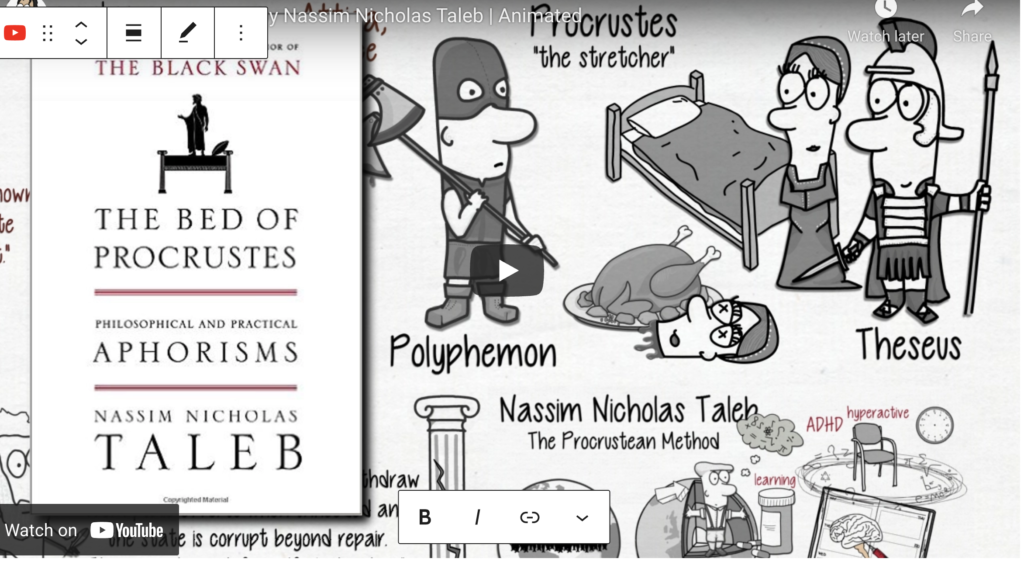
The Bed of Procrustes: Philosophical and Practical Aphorisms is a philosophy book by Nassim Nicholas Taleb written in the aphoristic style.
The title refers to Procrustes, a figure from Greek mythology who abducted travelers and stretched or chopped their bodies to fit the length of his bed.
For Taleb, the story of Procrustes is a metaphor for our modern age. It “contrasts the classical values of courage, elegance, and erudition against the modern diseases of nerdiness, philistinism, and phoniness.”
This book can be consider a synthesized version of Taleb’s other works: Fooled by Randomness, The Black Swan, and Antifragile, which deal with how to live in a world we don’t quite understand.
Every aphorism … is about a Procrustean bed of sorts—we humans, facing limits of knowledge, and things we do not observe, the unseen and the unknown, resolve the tension by squeezing life and the world into crisp commoditized ideas, reductive categories, specific vocabularies, and prepackaged narratives, which, on the occasion, has explosive consequences. Further, we seem unaware of this backward fitting, much like tailors who take great pride in delivering the perfectly fitting suit—but do so by surgically altering the limbs of their customers. For instance few realize that we are changing the brains of schoolchildren through medication in order to make them adjust to the curriculum, rather than the reverse. (Nassim Taleb)
35 AphorismS from “the Bed of Procrustes”
Love
Love without sacrifice is like theft.
Influence
You know you have influence when people start noticing your absence more than the presence of others.
Education
Education makes the wise slightly wiser, but it makes the fool vastly more dangerous.
Being funny
Some people are only funny when they try to be serious.
Revenge
The best revenge on a liar is to convince him that you believe what he said.
The originality test
The test of originality for an idea is not the absence of one single predecessor but the presence of multiple but incompatible ones.
Erudite
An erudite is someone who displays less than he knows; a journalist or consultant the opposite.
Advice
When we want to do something while unconsciously certain to fail, we seek advice so we can blame someone else for the failure.
Winning Arguments
You never win an argument until they attack your person.
Envy
They will envy you for your success, your wealth, for your intelligence, for your looks, for your status – but rarely for your wisdom.
Turning on creativity
Your brain is most intelligent when you don’t instruct it on what to do — something people who take showers discover on occasion.
Listening
Usually, what we call a “good listener” is someone with a skillfully polished indifference.
Fooling yourself
Over the long term, you are more likely to fool yourself than others
On Our Need For Stimulation
Most people fear being without audiovisual stimulation because they are too repetitive when they think and imagine things on their own.
Newspapers
To be completely cured of newspapers, spend a year reading the previous week’s newspapers.
Apologize
People usually apologize so they can do it again.
Technology
Technology is at its best when it is invisible.
Freedom
You don’t become completely free by just avoiding to be a slave; you also need to avoid becoming a master.
Modernity
Modernity: we created youth without heroism, age without wisdom, and life without grandeur.
Meditation
Meditation is a way to be narcissistic without hurting anyone
Inversion
People focus on role models; it is more effective to find antimodels—people you don’t want to resemble when you grow up.
Reading books
If you want people to read a book, tell them it is overrated.
Debates
In most debates, people seem to be trying to convince once another; but all they can hope for is new arguments to convince themselves.
Knowledge
The problem of knowledge is that there are many more books on birds written by ornithologists than books on birds written by birds and books on ornithologists written by birds
(#Ad) The Bed of Procrustes: Philosophical and Practical Aphorisms
Addiction
The three most harmful addictions are heroin, carbohydrates, and a monthly salary.
Writing
Writing is the art of repeating oneself without anyone noticing.
Modernity
My biggest problem with modernity may lie in the growing separation of the ethical and the legal
Book Reviews
It is much harder to write a book review for a book you’ve read than for a book you haven’t read.
Information age
The calamity of the information age is that the toxicity of data increases much faster than its benefits.
Via negativa
Most info-Web-media-newspaper types have a hard time swallowing the idea that knowledge is reached (mostly) by removing junk from people’s heads.
Convincing Others
You can only convince people who think they can benefit from being convinced.
Information
To bankrupt a fool, give him information.
When nobody is looking
The difference between magnificence and arrogance is in what one does when nobody is looking.
Illogical
Upon arriving at the hotel in Dubai, the businessman had a porter carry his luggage; I later saw him lifting free weights in the gym.
Employment
Those who do not think that employment is systemic slavery are either blind or employed.
